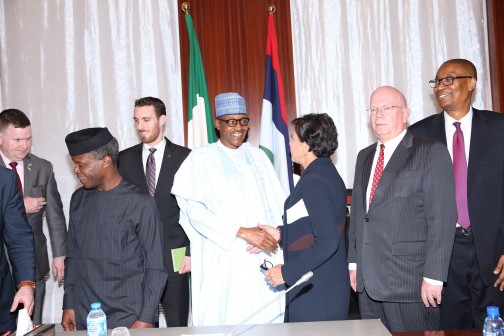
2014 Mandela Washington Fellows during the Summit with President Obama
“I have no doubt that you’re going to leave behind for the next generation – and the generation after that – an Africa that is strong and vibrant and prosperous, and is ascendant on the world stage.” Said
President Barack Obama at a Town Hall with Mandela Washington Fellows, July 2014.
In Africa today, it could easily be said that one of the most strategic, vigorous and determined attempts to develop sustainable leadership across the political, economic and business spectrums of the African continent is the establishment of the Young African Leaders Initiative (YALI). The President of the United States launched YALI in 2010 as a significantly effort to support, mentor and invest in the next generation of leaders in Africa as they address the challenges of the continent, foster growth and prosperity, bolster democratic governance, and enhance peace and security in the region.
With statistics showing that of the 1.2 billion people in the continent, more than 200 million are within the ages of 15 and 24, and approximately 60 percent of Africa’s total population is below the age of 35, there is no doubting that investment in youths is a necessary step towards the emergence of a transformed, more prosperous and developed Africa. To this end, through YALI, the United States has laudably committed resources towards enhancing their leadership skills, and promoting entrepreneurship in the continent.
It is worthy of note that the U.S. Department of State, since 2010, has commendably held 15 exchange programs specifically designed for young African leaders. The Department has evidently sponsored more than 1,600 sub-Saharan students and scholars through its educational and cultural affairs programs. And the U.S. embassies have awarded 80 small grants totaling 1,250,000 to YALI alumni groups supporting youth development in Africa.
In particularly, the Mandela Washington Fellowship, which is one of the programmes has been notable for bringing dynamic young African leaders within the ages 25 and 35 from across the continent to the United States for 6 weeks leadership training and mentoring. These youths are being engaged at twenty U.S. universities and colleges in three key areas: business and entrepreneurship, civic engagement and public administration. In 2016, the Fellowship is expected to provide 1,000 outstanding young leaders with the opportunity to sharpen their leadership and entrepreneurial skills, with support for professional development after they return home.
In 2015, the U.S embassy in Nigeria hosted a special reception to celebrate the impact of the anniversary of cultural, educational, and professional exchanges that the United States has enjoyed with Nigeria and the rest of the world. Held at the Transcorp Hilton Hotel in Abuja, some of the beneficiaries of the exchange expressed the impact of the exchange programmes in their personal lives and the contributions they have made in the society through the alumni networks.
Speaking on behalf of the Youth-Exchange-and-Study exchange alumni at the event, Aisha Waziri said the network has promoted peace especially in predominantly Muslim nations. It is also involved in organizing computer and vocational trainings for youth and women, as well as sensitizing the public on health issues. Similarly, Iyke Chukwu, who represented Humphrey Exchange Alumni, said the one-year-long exchange trained him on leadership and service. He added that the alumni network has identified climate change as an area of concern. So a group of people will help clean Abuja and create jobs for themselves through small and medium-scale enterprises that are environmentally viable.
With these testimonies, and the contributions of some notable Fellows, such Lagos State Governor Akinwumi Ambode, Edo State Governor Adams Oshiomhole, Professor Attahiru Jega, and Dr. Maitama Sule, to the peace, growth and development of Nigeria, there is no doubt that YALI, through the Fellowship programmes, truly represents the extraordinary promise of an emerging generation of entrepreneurs, activists, and public officials in the African continent.
Equally important, through YALI, the United State Agency for International Development (USAID) has over the past five years, incredibly invested more than US$100 million in over 76 partnerships with African universities. This is part of efforts of the United States to sustainably support the training of a new generation of African leaders in key sectors of the African economy, such as health, agriculture, education, environmental science, technology and other sectors. Currently, USAID has a Higher Education Solutions Network, a yearly programme of US$25 million, which is a partnership between some African and U.S. higher education institutions. The network of institutions uses science, technology and engineering to educate future leaders and research solutions for the greatest challenges in development.
In order to equip a reasonable number of African leaders, the U.S President established the YALI Network in 2013. The YALI Network, which currently includes nearly 200, 000 member, employs virtual tools, training, and technology to equip young leaders with the skills, exposure and connections they need to spur growth and development in African. Through its website and social media platforms, the young leaders are being offered free online courses and materials, with opportunity to connect with global leaders in their fields. With this, the United States is definitely committed with good efforts to building sustainable leadership and human capital, which is sine-qua-non for the emergence of a new Africa.
By Ehis Ayere…
ehis@old.africanleadership.co.uk


